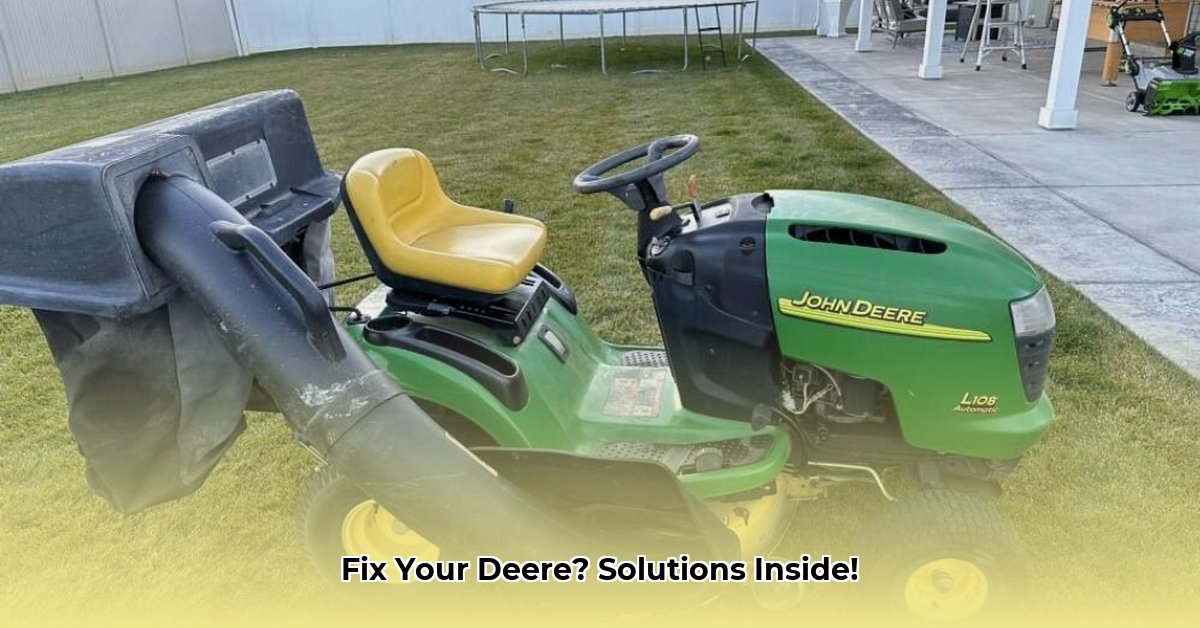
Let's face it: owning a John Deere tractor is a significant investment. However, even the most robust machines require occasional troubleshooting and repair. Fortunately, a thriving online community of John Deere owners shares solutions, experiences, and advice—a testament to the need for readily available troubleshooting information. This guide leverages that collective wisdom to provide practical, step-by-step solutions for common John Deere tractor problems. We'll explore engine stalling, hydraulic leaks, axle issues, parts availability, and attachment compatibility, empowering you to keep your tractor running smoothly. For additional help with tire repair, check out this helpful resource: tire repair guide.
Engine Stalling: Unexpected Stops in the Field
Engine stalling is a frequent frustration among John Deere owners, as evidenced by numerous forum posts. The sudden halt, especially during critical tasks, can be costly and disruptive.
Forum Insights: "My trusty 4020 just died in the middle of the field!" (User Post, John Deere Forum) This illustrates the urgent need for readily available solutions.
Possible Causes: Several factors can contribute to engine stalling. These include a clogged fuel filter (preventing fuel flow), malfunctioning fuel injectors (causing incomplete combustion), ignition system problems (preventing spark), or even a faulty sensor (disrupting engine control).
Solutions:
- Check the Fuel Filter: Inspect and clean or replace the fuel filter. This is a simple, inexpensive fix that often resolves the issue.
- Inspect Fuel Lines: Carefully examine fuel lines for leaks or blockages that may restrict fuel flow to the engine.
- Ignition System Diagnosis: If fuel delivery is confirmed, inspect the ignition system. This often requires more mechanical expertise; seek professional help if needed.
- Sensor Check (Professional Help Recommended): Faulty sensors can cause engine stalling. Consult a qualified mechanic for proper diagnosis and repair.
John Deere's Role: John Deere could enhance in-tractor diagnostic capabilities, providing users with clear on-board troubleshooting guidance and more detailed repair manuals. Improved sensor design and durability would also mitigate future stalling issues.
Hydraulic Headaches: Leaks and Lifting Woes
Hydraulic system failures, including leaks, are another common issue reported among John Deere owners, especially in models like the 212, 455, and X595. These failures can lead to significant downtime and repair costs.
Forum Feedback: "My 455's hydraulics are leaking like a sieve!" (John Deere Forum Post). This highlights the severity and frustration associated with these problems.
Potential Causes: Common causes include worn-out seals, damaged hoses, or a failing hydraulic pump.
Solutions:
- Visual Inspection: Thoroughly inspect all hoses and connections for cracks or leaks.
- Professional Repair: Repairing hydraulic leaks typically requires the skills of a qualified mechanic. Incorrect repairs can worsen the problem, leading to additional costs.
- Preventative Maintenance: Regularly check and maintain hydraulic fluid levels to prevent premature wear and tear.
John Deere's Role: John Deere could improve its hydraulic system design, enhancing seal durability and implementing better leak prevention strategies. Improved maintenance documentation would also be beneficial.
Axle Problems and Parts Availability: Keeping Your Deere Moving
Axle issues, particularly in older models (4320, X495), are regularly discussed in online forums. Additionally, sourcing replacement parts, especially for older tractors, can present challenges.
Forum Frustrations: "Finding parts for my older Deere is a nightmare." (John Deere Forum). This highlights a major pain point for many owners.
Potential Causes: Axle problems often result from significant wear and tear, corrosion, and age-related degradation. Parts availability for older models is often limited due to discontinued production.
Solutions:
- Explore Aftermarket Parts: Consider using aftermarket parts suppliers to find compatible components.
- Repair Existing Parts: Explore the possibility of repairing damaged components instead of direct replacement. This can sometimes be a more cost-effective course of action.
- Preventative Maintenance: Proactive maintenance is crucial in extending component life and delaying the need for replacements.
John Deere's Role: John Deere could improve parts availability for older models, perhaps by partnering with parts recyclers or creating a dedicated parts exchange program.
Attachments and Compatibility: Avoiding Hitch Problems
Connecting attachments, such as mower decks or snow blowers, can sometimes lead to compatibility issues, as often reported in the John Deere forums.
Forum Feedback: Numerous users report difficulties with proper attachment fitment and compatibility.
Potential Causes: Ambiguous or incomplete manuals, variations in manufacturing tolerances between attachments and tractors, and a lack of clear compatibility guidelines all contribute to these problems.
Solutions:
- Thorough Manual Review: Carefully read and review all relevant operator's manuals. Pay particular attention to compatibility charts or diagrams.
- Online Community Research: Use online John Deere forums to search for solutions and experiences relevant to your specific attachment and tractor model.
- Seek Professional Assistance: In the case of uncertainty, always consult a qualified technician to ensure proper and safe installation.
John Deere's Role: John Deere can significantly improve user experience by providing clearer, more user-friendly manuals, illustrated with helpful diagrams and videos demonstrating proper attachment procedures. Updated compatibility guides would also be greatly beneficial.
Key Takeaways and Recommendations
This guide underscores the importance of both the online John Deere community and proactive improvements from John Deere itself. Preventative maintenance, community knowledge sharing, and improved official support are crucial for tractor longevity and user satisfaction. Regularly consulting online forums and following recommended maintenance schedules can help prevent costly repairs and extend the lifespan of your John Deere tractor.